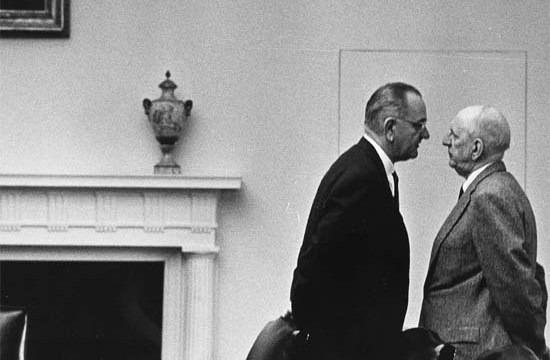An Obamacon’s Lament

As President Obama doggedly prioritizes universal coverage over a thorough revamp of the health care system that would deliver truly efficient, sustainable care, “Obamacons”, like me, who helped elect him, have no one to blame but themselves. “Small government” minded in my political philosophy, and a registered Republican in my affiliation, I knew I was ultimately cutting off my nose off to spite my face in voting for the President. Nonetheless, I took the plunge under the weight of Bush fatigue and the jaded expectation that neither party could really be trusted to keep the size of government in check anyway—plus, Obama is just so damn charming.
With the health care debate now in full force, the scalpel has come down more like a jagged saw, pulled awkwardly between the President’s zealous and increasingly ideological push for a health care revolution, and the GOP’s opposition strategy, which so far has involved hurling bald-faced lies like Molotov cocktails into the debate (check out the non-partisan Politifact.com for a rundown of the best GOP fabrications). Astride them, ill at ease, sits the Obamacon, in a special, and perhaps particularly cruel circle of the political inferno reserved for those guilty of a quixotic compromise of their principles.
This sad lot represents an increasing portion of the electorate that is deeply dissatisfied with the substance of the debate—both the options and explanations put forward by the President, as well the lack thereof from the Republicans. We agree with the President that something is horribly wrong with the system—chiefly, that the rate of inflation is simply unsustainable, especially relative to the quality of care. There are many reasons for this, stemming most directly from a fundamental misalignment of the incentives that govern the economics of our health care system, not from the fact that significant portions of the population are uninsured per se. Put most simply, there’s too much insurance going to the wrong people, who in turn over-consume care at every point of the process.
For a good primer on the health care system’s misalignment, check out leading health care economist, and Obama adviser, David Cutler’s recent interview on Big Think:
But, rather than addressing the structural faults in the system as his first priority, the President has treated them more like an afterthought, tacking them onto a colossal expansion of the existing system out of a sense of moral imperative. This is where he is losing the Obamacons and countless others who may not comprehend the precise details of health care reform (no thanks to the Republicans), but appreciate that it is not a problem to be solved by building castles to the sky on shaky ground. With all due respect, the person who seems to understand this least is the President himself.
To build a true health care reform coalition, Obama’s should focus squarely on how to make the system deliver better care more cost-effectively. That means talking less about Lori Hitchcock, an entrepreneur with hepatitis C who can’t get insured, and more about Jenny Paley, a friend of mine and a successful young executive in her late 20’s with good insurance.
In a well-designed system, Jenny would have far less insurance than she does today. As an exceptionally healthy 29-year old with no family medical history or known genetic dispositions, she simply doesn’t need it. Yet, because of the nature of our employer-driven system and the twisted incentives it imposes, Jenny finds herself going to the dermatologist for no less than five follow-on consultations to explore problems she didn’t think she had when she responded to a mailed reminder for her “yearly consultation”. Jenny attends dutifully nevertheless because her employer-provided health care, which she receives in lieu of a portion of her pay, covers everything. And, while it covers unlimited dermatology, the plan doesn’t cover Jenny’s pap smear results—only the tests. Why, you ask? Because the state of NY doesn’t require it—although it does require extensive coverage that Jenny doesn’t need and wouldn’t submit to if it weren’t seemingly free, like her dermatology triage. And because the federal government has for decades subsidized employer-provided health care through tax breaks, Jenny’s employer gives her care she doesn’t need in lieu of pay she would likely prefer.
All the while, Lori Hitchcock can’t get coverage for her hepatitis C. The true moral outrage is a system that hemorrhages with waste while so many go wanting (for perhaps the single best overview of misaligned incentives of the current, see David Goldhill’s cover story (based on his book by the same name) in this month’s The Atlantic, “How American Health Care Killed My Father”. We have a legacy system built over a century that, like so much of our society, is in need of a systemic overhaul because its various parts—built and implemented across political eras—are not smart or efficient enough to meet the demands of a globalizing society. The current plan being advanced by the President, and stymied in Congress, simply builds on top of what is there already, instead of taking the wrecking ball and rebuilding a truly modern system.
The problem we face is vast, involving no less than a dozen major constituencies that represent nearly every interest class, from the poor to big business. Many of these interests have made considerable investment in a faulty system and will be cost dearly should it change. However, our failure to properly address this crisis until now shouldn’t pave the way for strides in the wrong direction, nor should it forgive compromise that fails to meet the true challenge for fear of upsetting special interests.
Nobel Laureate Paul Krugman offered a case in point in a recent column, in which he acknowledged the Obama plan was not the one we would want in a perfect world, as it will certainly cost more than more efficient alternatives. Yet Krugman supports the Obama plan nonetheless because it’s the most politically viable option that would deliver universal care. The President has equally embraced this “No We Can’t” political expediency that has effectively put the cart before the horse and left the fiscal crisis in tow.
By targeting coverage before cost, the President has also served to marginalize innovative solutions to the fiscal problem, such as those put forward by Whole Foods CEO John Mackey. In a controversial recent op-ed in the Wall Street Journal, Mackey highlighted some of the successful approaches employed by his own company, which uses high deductible company-provided coverage combined with contributions to flexible health accounts. He then lays out a litany of policy reforms, from insurance deregulation to greater cost transparency, that would help the U.S. system more closely resemble the Whole Foods system. And, Mackey’s plan is by no means exhaustive – for instance, Clay Christensen’s notion of shifting the burden of basic care to a new class of skilled nurse practitioners would no doubt enhance the value of care still further.
In both cases, however, sensible solutions to imminent problems have been left out of the current debate—it is this lack of focus on the system’s critical failings that should compel the President to embrace a fundamental rethink of the system, not an expansion of it, as the vital first step in reform. That promises better, more sustainable care to more, if not all, people. Such a systemic reform would require more concessions from more stakeholders—from trial lawyers to major hospitals and insurers alike—but also a frank admission of the role of outdated and bad regulations in perverting incentives.





